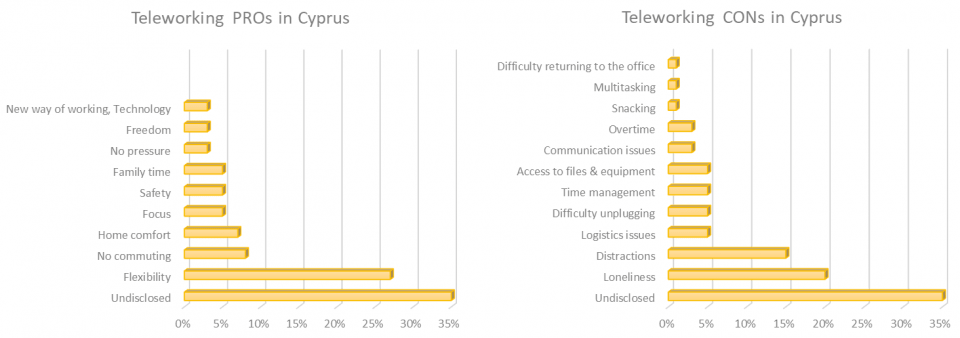FinExpertiza Cyprus research reveals the perceived pros and cons of teleworking
Michael Hadjihannas
Managing Director, FinExpertiza Cyprus
Development Director for Europe, FinExpertiza Global
With a modest 1.3 per cent of its workforce working remotely in 2019, Cyprus saw a significant spike in those working from home during the Covid-19 lockdown, April through May 2020.
According to Deputy Minister of Research, Innovation and Digital Policy Kyriakos Kokkinos, teleworking greatly benefited both employers and employees. Multiple researches report an increase in productivity, varying from 20 to 70 per cent, bringing about a change in organisational structure and a whole new level of digital transformation of Cyprus.
With the exception of certain professions that are location-dependent, e.g. health sector, food & beverage supply and distribution, retail, utilities supply, construction, manufacturing, etc, it’s safe to assume that the majority of the white-collar workforce in Cyprus including governmental and semi-governmental institutions were working remotely during the quarantine.
While some companies were working remotely before - and will continue to do so - the Covid-19 pandemic saw the majority working-at-the-premises.
Though businesses worldwide report that teleworking has overall increased company productivity and have a 25 per cent lower employee turnover, working remotely does have a considerable number of challenges, beginning with loneliness and overcoming the remote disengagement hurdle. There are concerns around the balancing of worker privacy and safety rights with organisational data security, as well as the difficulty to unplug after the end of workday. Further, distractions at home can pose quite a challenge as well, regardless of having - or not - a family. It is also important to mention the significance of managing the wellbeing and morale, as much as the inclusive and cohesive cultures for teams.
Lastly, even though there is a plethora of chat applications and video-conferencing software, there is often a mention of the difficulties in communication and collaboration between off-site and on-site colleagues. Our research states that the quality of communication between colleagues working remotely in Cyprus has reportedly remained the same for 74 per cent of respondents, with 17 per cent reporting better and nine per cent worse communication during teleworking. Skype and Zoom, followed closely by the Microsoft Teams and WhatsApp, were most frequently used in Cyprus to communicate between co-workers during the lockdown.

Though there is a significant acknowledgement on the island of the positive impact on the environment, as well as a substantial reduction in cost for the employers brought by the teleworking, whether it’s the lockdown-blues or the lack of stability, middle and high-skill workers in Cyprus continue to choose working at the office and keeping a healthy balance between personal and professional life.
Source.
Read Also
